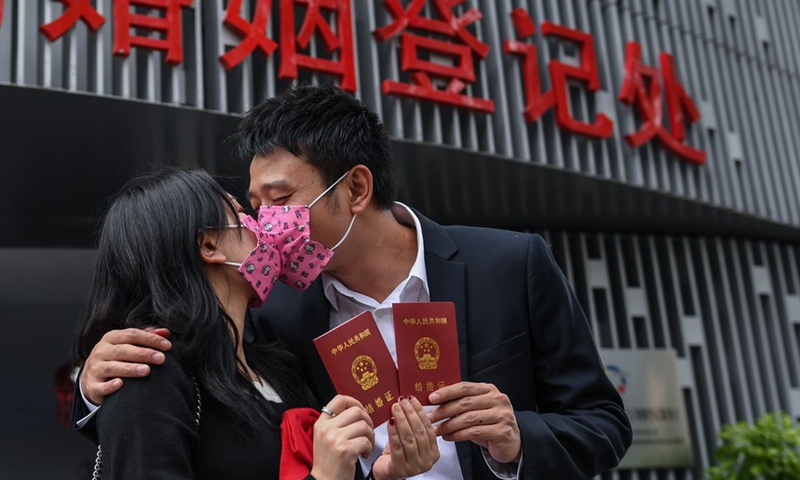China to make marriage certification procedures more ceremonious
By Cui Fandi Source: Global Times Published: 2020/9/9 23:47:58

Deng Lingling (L) and Deng Junwei kiss while displaying their marriage certificates in front of the marriage registration office of the Civil Affairs Bureau of Nanshan District in Shenzhen, south China's Guangdong Province, Feb. 14, 2020. (Xinhua/Mao Siqian)
Amid soaring divorce rates, China is mulling measures to make the marriage certification procedure more ceremonious to help build a more solemn atmosphere for newlyweds, but the proposal has sparked some controversy.
The guidance, jointly published by China's Ministry of Civil Affairs and the All-China Women's Federation on Tuesday, suggested further ritualizing the process of getting married, including offering pre-marriage counseling, upgrading marriage certification services, encouraging couples to say oaths, and inviting local authorities and celebrities to certify newlyweds.
The pre-marriage counseling includes promotion of marriage and family culture, family responsibilities, communication skills, and family development planning. It aims to prepare newlyweds for marriage and help them learn to manage their marriages to reduce marital and family disputes in the future, according to the guidance.
The marriage certification procedures may have the bureau officers guide the newlyweds to say the marriage oaths to create "a solemn atmosphere" for the process. Newlyweds will be encouraged to invite their family and friends to witness their certification and ceremony.
There are various local customs, but China has not issued any official guidance on marriage rituals before. Currently, for couples who want to get married, all they have to do is walk into a civil affairs bureau and pay 9 yuan ($1.3) to register as a legal couple.
To some, the process of getting married seems a little dry and unromantic. On China's Twitter-like Sina Weibo, some supported the proposal, saying "marriage needs some rituals."
But others had doubts. "Rituals cannot be the solution to possible problems in marriages," one netizen said.
The divorce rate has been soaring in China in the past decade and the marriage rate has seen a significant drop since 2014. China is also seeing a growing trend of late marriages.
In China's first-ever civil code, which was approved in May, a 30-day cooling-off period for couples who apply for divorce was introduced, which mandates couples must take time to consider their decision after handing in the application for a divorce.
Peng Xizhe, dean of the School of Social Development and Public Policy at Shanghai's Fudan University and ex-vice president of the Shanghai Academy of Marriage and Family, said the policy could prepare young couples for the social responsibility of marriage and family, which is a missing part of China's marriage system.
"It is important that newly formed families take marriage seriously, especially in an era of rapid marriage and divorce," Peng noted.
To Luo Ruixue, a member of the Guangzhou-based women's rights protection group Women Awakening Network, the newly published guidance offers hope of restoring the public's confidence in marriage. However, restoring young Chinese women's confidence in marriage will be harder.
"The policy apparently has positive intentions, but after the recent series of bad incidents, the fear of marriage among women cannot be addressed just by guidance," Luo told the Global Times on Wednesday. "We should all work toward implementing the laws and policies for the protection of women, including the anti-domestic violence law, at the local levels. In that way, social confidence in marriage would naturally be restored."
Posted in: SOCIETY,CHINA FOCUS